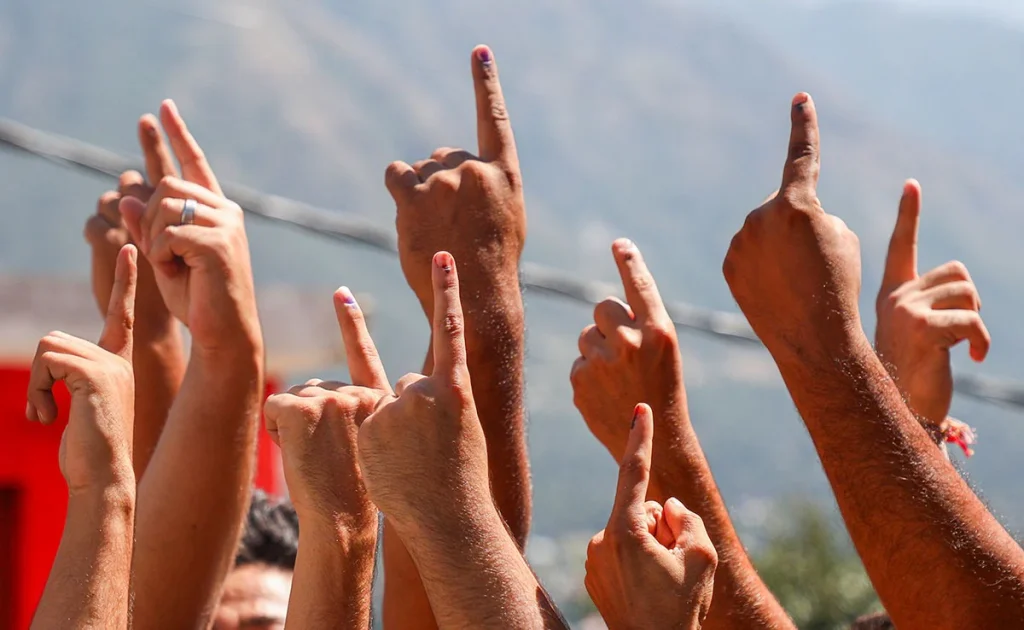Context:
Recently, the Union cabinet approved the “One Nation, One Election” proposal, allowing for simultaneous elections across the country.
More on the News
- The High-Level Committee (HLC) was formed on September 2, 2023, chaired by former President Ram Nath Kovind submitted a report in March on the feasibility of simultaneous elections.
- The report unanimously recommended that Lok Sabha and State Assembly elections be held at the same time, followed by synchronized local body elections within 100 days.
ABOUT ONE NATION ONE ELECTION (ONOE)
- Simultaneous elections, popularly referred to as “One Nation, One Election”, means holding elections to Lok Sabha, all state Legislative Assemblies, and urban and rural local bodies (municipalities and panchayats) at the same time.
- Currently, all these elections are held independently of one another, following timelines dictated by the terms of every individual elected body.
Key Recommendations of the Committee
Two-Step Process for Constitutional Amendment:
- Step 1: Hold simultaneous elections for Lok Sabha and State Legislative Assemblies without requiring state ratification.
- Step 2: Synchronize local body elections within 100 days of the Lok Sabha and state elections, needing ratification from at least half the states.
Tenure Adjustment for State Assemblies:
- The President will set an “appointed date” for synchronizing elections, leading to the early end of State Assemblies’ terms, which will conclude with the Lok Sabha’s term in 2029. States with elections from June 2024 to May 2029 will have shorter tenures.
Handling Emergencies:
- If a Parliament or state assembly is prematurely dissolved, fresh elections will only cover the remaining term until the next cycle of simultaneous polls.
- The committee rejected the German model of a constructive vote of no-confidence, advocating instead for elections for the unexpired term.
Constitutional Amendments Required:
- Insertion of Article 82A: This new provision provides that all the Legislative Assemblies constituted in any general election held after the “appointed date” shall come to an end on the expiry of the full term of the Lok Sabha.
- It further provides that if the ECI is unable to conduct such simultaneous polls, it will make a recommendation to the President, to declare by an Order, that the election to that Legislative Assembly may be conducted at a later date.
- However, even in cases where the State Assembly election is deferred, the term of the Legislative Assembly will end on the same date as the end of the full term of the Lok Sabha constituted in the General Election.
- Amendment to Articles 83 & 172: These provisions provide for a “five-year term” to the Lok Sabha and State Assemblies respectively. The Committee has recommended that this five-year term should be referred to as “the full term” and if the Lok Sabha or the State Assembly is dissolved prematurely, then the remaining period will be referred to as the “unexpired term”.
- Thus, the new Lok Sabha or State Assembly will serve only for the remaining “unexpired term” before being dissolved again once the simultaneous polls are conducted as scheduled.
- Insertion of Article 324A: This new provision would empower the Parliament to make laws to ensure that elections to municipalities and panchayats are held simultaneously with the general elections.
- Single Electoral Roll and Election ID: Amend Article 325 to allow for a single electoral roll and Voter ID for all government tiers, requiring ratification from at least half the states.
- Logistical Planning: The ECI and State Election Commissions should prepare logistics in advance, including acquiring voting equipment and deploying personnel.

